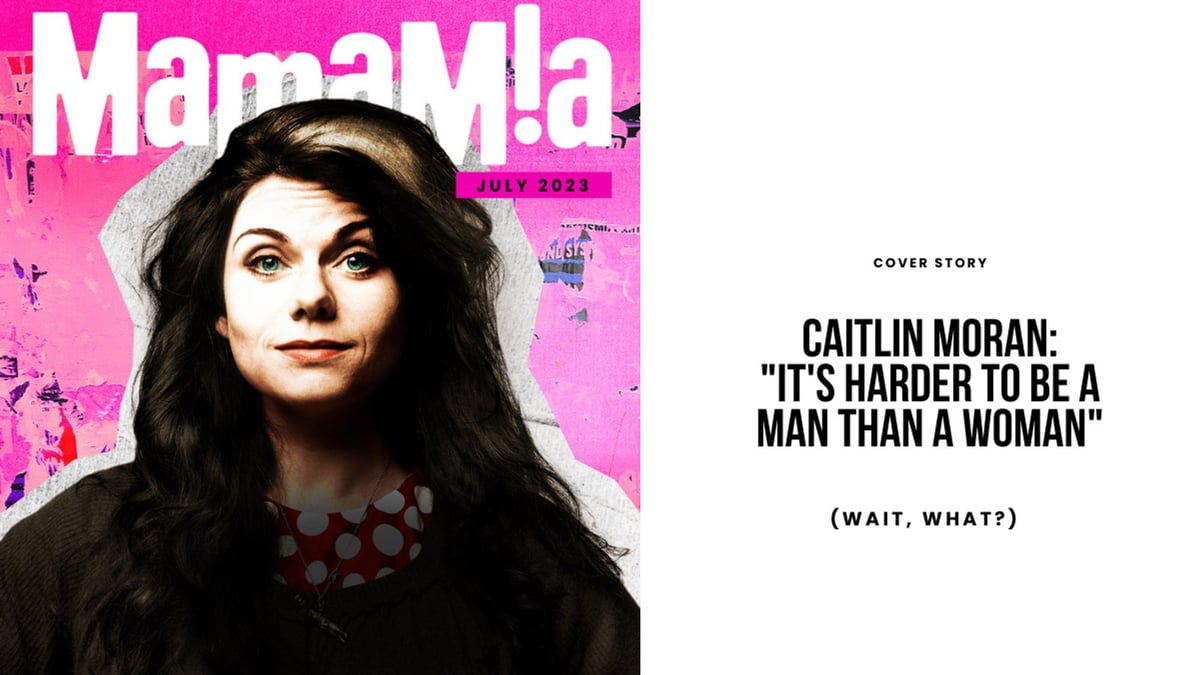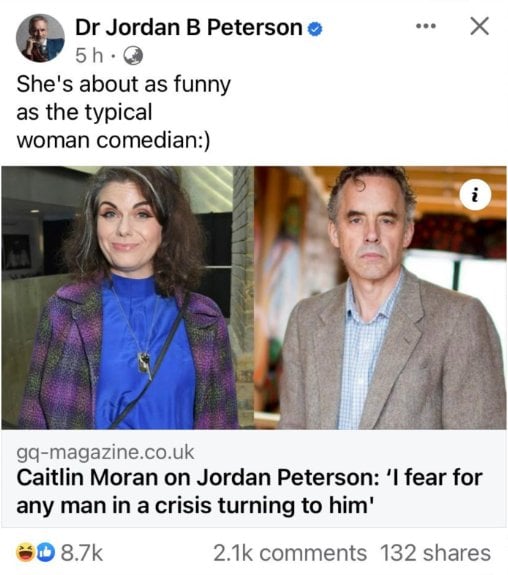Caitlin Moran has written a new book, and it’s about how hard it is to be a straight, white man right now.
If you’re familiar with Moran’s body of work, which includes half a dozen-best selling fiction and non-fiction books about feminism, most notably the 2011 international best-selling feminist manifesto How to Be A Woman, we’ll give you a moment to process the previous sentence.
Even if you didn’t know that Moran is one of the most famous feminists of her generation, it may well be surprising that someone — anyone — would proudly dedicate 310 pages to worrying about men and boys in 2023. Let alone lay out her concern directly in the book’s unexpected title What About Men?
And that’s precisely why Moran did it. To address a question that many are asking, but most aren't comfortable to answer. Certainly not women.
Speaking to Mamamia’s No Filter podcast, the popular columnist and author said the book is rooted in the swell of anger she’s observed in boys and young men in recent years.
Moran wasn’t the only one noticing. At book signings and events, women had begun querying her about advice for their sons. Her. Caitlin Moran. The (self-described) ‘Woman Woman’. At first, she was intensely irritated by the question. I have no idea, she’d shrug plaintively at event after event. Not my concern. I’m here for the ladies. The women. The girls. Someone else can sort out what to do about the men.
Then she’d go home and hear the same thing from the male friends and classmates of her teenage daughters. When she spoke to these boys, they told her that feminism has “gone too far”, that it’s harder to be a man these days than a woman, that everything is stacked against men, and that they are losing.
The idea intrigued her.
“We know all the stats. Women are still underrepresented in business and politics and sport. The pay gap still exists. One in four of us will be sexually assaulted or raped. So in the material world, women aren't winning,” Moran told Mamamia. “So what is it that women have that's making [boys] scared and angry?”
She came to a simple conclusion: Feminism.
They’re also ashamed and confused.
Many of them belong to a group that have historically been the architects of the patriarchal structures that feminism is working to dismantle: “straight, white men.” They hear that very identity being derided. They hear people describing masculinity as “toxic”.
“For people of our generation… we know what the last 10,000 years of patriarchy have been like, and how recent women being able to vote or have any kind of power has been,” she said.
“If you're a 15-year-old boy, you have none of that perspective. All you know is that straight, white men are the one group that you're allowed to make jokes about. They're the one group you're allowed to eyeroll about.
“They know that simply by describing themselves as straight, white men, they sound like a problem.”
Moran’s research ultimately led her not only to believe these men, but agree with them. In many ways, she argues, it is harder to be a man.
In her book, Moran outlines some of these particularly challenges facing men and boys and how their existence is harmful to all genders.
Among them, the way stoicism can prevent men from being emotionally vulnerable with each other and even from seeking medical care. How the pressure to earn often takes men away from caregiving to the detriment of the entire family. How there’s not been a body positivity movement for men, largely because homophobia prevents them from celebrating each other’s bodies.
Like many other women, particularly the mothers of sons, one of her biggest laments is the relative lack of positive, public male role models. Not sports stars or celebrities, but people who show young boys what becoming a healthy, productive, good man looks like.
Enter Jordan B. Peterson and Andrew Tate, viral phenomenons who appeal to (and have profited enormously from) theanger, confusion and feelings of disaffection among men, particularly young men and even boys.Tate, an American kickboxer-turned-influencer who proudly describes himself as a misogynist, boasts more than 7 million Twitter followers and was the eighth most-Googled person in the world in 2022. Among his controversial messages are that women “belong in the home”, are “intrinsically lazy”, and ought to “bear responsibility” for being sexually assaulted. (Sidenote: Tate is currently awaiting trial in Romania on charges of rape and sex trafficking.)
“Every school in the UK has had to have a staff meeting to deal with the disruption that he causes in classes,” Moran said. “[Boys] are shouting out his catchphrases. Female teachers are getting homework handed back to them by boys that have ‘make me a sandwich’ written on the bottom, because they don't believe women should teach them. Male teachers are being asked, ‘Sir, do you let your wife go out on her own?’ People are so worried about this.”
Jordan B. Peterson, meanwhile, is a psychology professor turned YouTube philosopher and self-help guru who argues (verbosely) that a society based on a patriarchy makes sense and that white privilege is a farce.
GQ recently published an extract of Moran’s book in which she argues why Peterson is not a good role model for boys and men. Among her points: Peterson promotes a dangerous diet of exclusively beef, salt and water; he peddles climate-change denialism and misinformation about vaccines; the truths he hits on are “usually someone else’s”, like Jung or Freud; and he justifies social hierarchy by making tenuous links between humans and lobsters*.
Last week, Peterson shared the extract to his 4.4 million Twitter followers, with the caption: “She's about as funny as the typical woman comedian :)”
When asked how she felt about this, Moran says she is grateful. “He's supposed to be ‘the most intelligent man in the world’, or one of them; ‘the most important public intellectual of our time’. But he shared a piece to his followers in which I think I do a pretty good demolishment job of his entire career and oeuvre,” she said. “He’s done me a massive favour.”
These men are persuading others that the solution to their frustration is to reclaim power, to reassert their ‘rightful’, ‘natural’ place in society.
But Moran argues that they need something else.
“The solution to feeling like a depressed, anxious teenage boy who doesn't know his place in the world isn't power, or power over women. What they need is what women have, which is empowerment,” she said. “They need to learn to self-soothe. They need to learn to make their lives beautiful. They need to learn to communicate. They need to confess their tenderness and weakness and vulnerability, and feel safe in that.”
That is at the heart of her argument and it’s a compelling point.
“Look what feminism has done for women. We took a bunch of your male stuff, and it's definitely improved our lives,” she said, addressing boys.
“Why don't you come and take a bunch of this female stuff, and let's just abolish these gender roles. F*** the patriarchy! Let's just have whatever we need as human beings, because we're here for such a short amount of time.”
* Footnote: (In his book,12 Rules for Life: An Antidote to Chaos, Peterson attempts to justify why social hierarchies exist. One example he uses is that lobsters which fight their way to dominance have increased levels of the happiness chemical serotonin. Those who suffer defeat have depleted levels, and therefore find it harder to climb back up the ladder.
“Very palpably, human beings aren't lobsters,” Moran said. “We don't have gigantic, delicious hands. We don’t urinate out of our eyes,” Moran said.
'I thought I knew who Andrew Tate was. Then I discovered his 'hand gesture'.
The following is an extract from Caitlin’s new book.
‘I found out who Andrew Tate was on Christmas Day,’ a friend says.
Oh, that sounds . . . festive. How?
‘I had my nephew over, who’s having . . . a difficult time. We were talking around the table, and I noticed my daughter was becoming distressed. I took her into the bath-
room and asked why, and she said he was doing the Andrew Tate Hand Gesture.’
The . . . what?
‘There’s a hand gesture Andrew Tate does. He puts all the tips of his fingers and thumbs together, into a kind of . . . steeple.’
She showed me. It’s the thing elderly professors do when they’re about to make a very pointed comment about e.g. Minoan history.
‘What does it mean?’
‘Well, my daughter said it just means he supports Andrew Tate. It’s a way of saying, “Shut up, women.” And he was doing it at her. She knew what it meant. It really upset her. And then she told me who Andrew Tate was, and it upset me, too. On Christmas Day! Just before pudding!’
My friend seemed very upset. ‘I don’t understand! He’s 15, and he seems immersed in this really right-wing, misogynist culture – but his parents are so nice ! They’re just . . . classic, left-wing, liberal,
Guardian-reading nice people! I don’t understand how they have a son like this!’
I paused for a minute. I knew why.
‘Why?’
‘Well, it’s because they’re lovely, left-wing, liberal people, isn’t it?’ I said. ‘Like, do you think they ever say things like
“This is classic, straight white male behaviour”, or “Typical men!”, or “Ugh, toxic patriarchy!”’
My friend thought. ‘Well, of course,’ she said. ‘They live in Hackney.’
‘That will be why, then,’ I said. ‘If he’s grown up hearing that straight white men are awful – if he’s been made to feel shame, and guilt, over who he is – if there’s a lot of conversation about how most of the problems in the world are down to men – then of course he’s going to be attracted to a man who says, “Don’t be ashamed! Men are great! We need men! Men are the best! Fuck woke-dom!” I mean, why wouldn’t he? That’s a classic piece of dumb, teenage rebellion against parents. What were you talking about, when he started doing the Hand Gesture?’
She thought.
‘Gender-neutral toilets.’
‘Well, there you go.’
Andrew Tate is the ‘King of Toxic Masculinity’; one of 2022’s most-googled people on earth; banned, on and off, from Facebook, Twitter, Instagram and YouTube; and a self-proclaimed ‘trillionaire’. Although, as he noted, ‘in Zimbabwean dollars’.
During the writing of this book, Andrew Tate went from one of the most popular male influencers in the world – 4.5 million followers on Instagram, 600,000 subscribers to his YouTube channel, ‘Tate Speech’ videos viewed over 14 billion times on TikTok – to a man under arrest in Romania, as part of a rape and human-trafficking investigation.
This is an extract from What About Men? by Caitlin Moran. Ebury Press, RRP $35, available now from bookstores, as an eBook and audiobook.

.png?width=1024)

